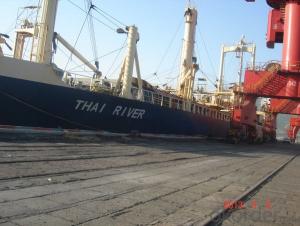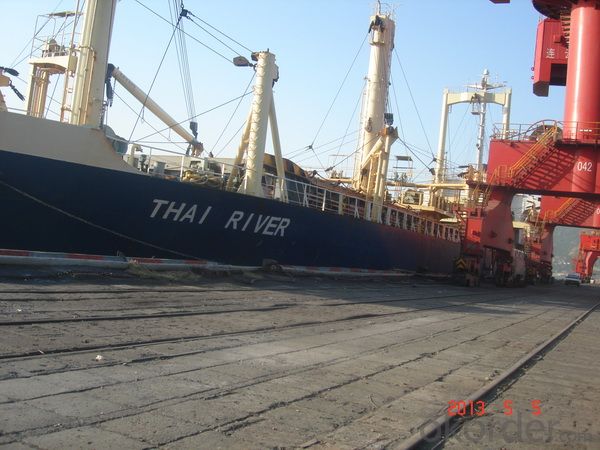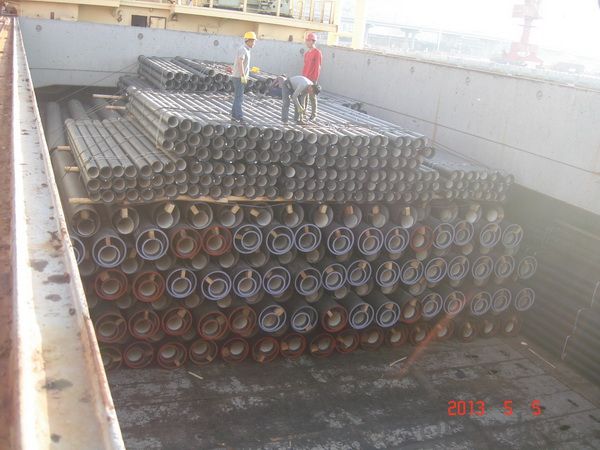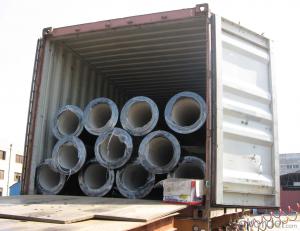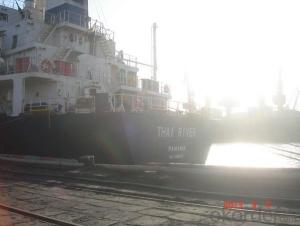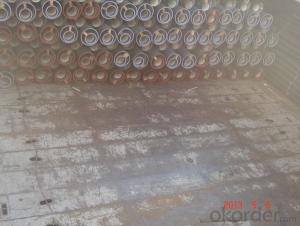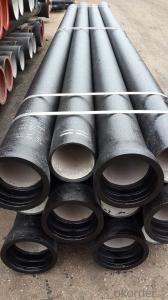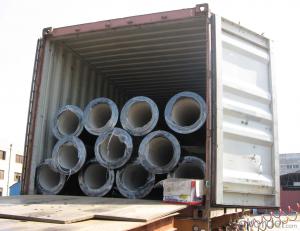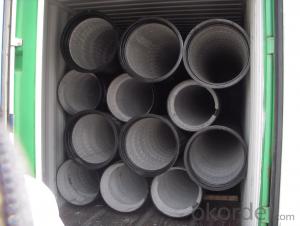DUCTILE IRON PIPES AND PIPE FITTINGS C CLASS DN600
- Loading Port:
- Tianjin
- Payment Terms:
- TT OR LC
- Min Order Qty:
- 22 pc
- Supply Capability:
- 3000 pc/month
OKorder Service Pledge
OKorder Financial Service
You Might Also Like
Material : Ductile Cast Iron
Size Range : DN 80mm to DN 2000mm
Unit Effective Length : 6m or 5.7m
Manufacture Standard: ISO 2531:1998/ EN 545:2006/EN 598:2007
Annual capacity : 200,000 tons
Coating Exterior: Zinc 130g/m2 according to ISO 8179-1 and bitumen coating 70 microns.
Cement Interior: Portland Cement/ High Alumina Cement/ Sulphate Resisting Cement Lining according to ISO 4179
Special requirements on external coating and internal lining can be applied
We also provide accessories such as SBR/EPDM rubber gaskets, lubricant paste, pipe caps, PE sleeves, etc.
Additional Parts:
Each pipe is strictly inspected according to related standard to ensure permanently high performance.
Easy Installation at site and service free for life
Long Service Lifespan
Quotation will arrive you within 24hours once we get your inquiry.
We guarantee offering you a competitive price.
A copy of original inspection reports of pipes will be offered after shipment.
Photos of loading process will be sent to the customer after shipment effect.
We will follow-up the delivery progress after shipment effect and update to the customer on weekly basis.
- Q: How do ductile iron pipes perform in acidic soil conditions?
- Ductile iron pipes have a reputation for being durable and resistant to different environmental conditions, including acidic soil conditions. When exposed to acidic soil, these pipes exhibit excellent resistance to corrosion due to their unique composition and protective coating. The high carbon content in ductile iron pipes gives them inherent resistance to corrosion, even in acidic environments. Additionally, these pipes are typically lined with cement mortar or a suitable epoxy coating, which provides an extra layer of protection against acid attack. The combination of the high carbon content and protective coating creates a barrier that prevents direct contact between the acid and the iron, thus minimizing the risk of corrosion. This ensures that the pipes remain structurally sound and maintain their integrity over a long period of time. Furthermore, ductile iron pipes have a long service life and are designed to withstand a wide range of soil conditions. Their strength and flexibility enable them to endure the stresses and strains caused by the surrounding soil, including acidic soil environments. This makes them an ideal choice for applications in soils with higher acidity levels. It is important to note that while ductile iron pipes perform well in acidic soil conditions, the severity and concentration of the acid can affect their performance. In extremely aggressive or highly concentrated acidic environments, additional corrosion protection measures may be necessary, such as sacrificial anodes or cathodic protection systems. In conclusion, ductile iron pipes are highly resilient and excel in acidic soil conditions. Their corrosion resistance, combined with their strong structure and protective coating, ensures their longevity and reliability, making them a preferred choice for various applications in such environments.
- Q: Are ductile iron pipes resistant to soil movement?
- Indeed, soil movement poses no threat to ductile iron pipes. These pipes boast an impressive tensile strength, enabling them to withstand external forces like soil movement. Specifically engineered for flexibility, they possess the ability to absorb and distribute stresses stemming from ground settlement or other soil movements. Moreover, their robust construction allows them to resist the compressive forces exerted by the surrounding soil. Consequently, ductile iron pipes represent a dependable and enduring option for underground pipelines, ensuring long-term stability and safeguarding against soil movement.
- Q: How does ductile iron pipe perform in high-temperature steam applications?
- Ductile iron pipe performs well in high-temperature steam applications due to its inherent strength and ability to withstand thermal stress. Its high melting point and resistance to corrosion make it a reliable choice for transporting steam at elevated temperatures. Additionally, ductile iron's thermal conductivity helps to dissipate heat efficiently, ensuring the pipe's integrity and preventing potential failures.
- Q: What are the typical pressure surge protection measures for ductile iron pipe?
- Some typical pressure surge protection measures for ductile iron pipe include using surge tanks or pressure relief valves, installing air valves or surge anticipation valves, and implementing proper anchoring and support systems to minimize movement and stress on the pipe during pressure surges. Additionally, using flexible joints or expansion joints can help absorb and accommodate sudden changes in pressure.
- Q: The difference between cast iron pipe and ductile iron pipe
- Ductile iron is based on the cast iron to change some of the characteristics of the structure of iron, so that it has become a lot of toughness, than the cast iron pipe is too brittle shortcomings much better, the tensile strength of the pipe bending strength greatly improved. The sealing material used in the socket interface is rubber ring.
- Q: Principles for the antiseptic treatment of ductile iron pipes
- Anti corrosion process of ductile iron pipe:1. asphalt paint coatingBituminous paint coatings are pipes used to carry gas. Preheating the pipe before spraying can improve the adhesion of asphalt paint and accelerate drying.2. cement mortar lining + special coatingThe internal corrosion prevention measures are suitable for pipes conveying sewage, and the corrosion resistance of lining can be improved.3. epoxy coal tar coatingThe epoxy coal tar coating is not only suitable for gas pipelines, but also for sewage pipes. It is a two component coating with a high adhesion and a very smooth surface
- Q: What is the expected deflection range for ductile iron pipes?
- The expected deflection range for ductile iron pipes typically falls within the range of 2-5% of the pipe's diameter.
- Q: How is ductile iron pipe tested for quality?
- Ductile iron pipe is tested for quality through various methods, including visual inspection, hydrostatic pressure testing, and mechanical property testing. Visual inspection ensures that the pipe is free from any visible defects or imperfections. Hydrostatic pressure testing involves subjecting the pipe to water pressure that exceeds its maximum working pressure to check for any leaks or failures. Mechanical property testing assesses the pipe's strength, toughness, and other mechanical properties through tests such as tensile strength, yield strength, and elongation. These quality tests help ensure that ductile iron pipes meet the required standards and are suitable for their intended applications.
- Q: What are the different pressure classes available for ductile iron pipes?
- There are several pressure classes available for ductile iron pipes, which are typically used for water and wastewater applications. The most common pressure classes for ductile iron pipes include Class 150, Class 200, Class 250, Class 300, and Class 350. These pressure classes indicate the maximum working pressure that the pipe can withstand in pounds per square inch (psi). Class 150 ductile iron pipes have a maximum working pressure of 150 psi, while Class 200 pipes can handle up to 200 psi. Class 250 pipes can withstand pressures up to 250 psi, and Class 300 pipes have a maximum working pressure of 300 psi. The highest pressure class, Class 350, can handle pressures up to 350 psi. The selection of the appropriate pressure class for a ductile iron pipe depends on various factors such as the system design, fluid characteristics, and operating conditions. It is important to consult the relevant standards and guidelines, such as the American Water Works Association (AWWA) standards, to determine the appropriate pressure class for a specific application. It is worth noting that these pressure classes refer to the working pressure of the pipe, which is the pressure the pipe is designed to safely contain during normal operation. The pipes are typically tested and certified to ensure they meet the required pressure class standards.
- Q: Can ductile iron pipe be used for marine applications?
- Yes, ductile iron pipe can be used for marine applications. Ductile iron is a type of cast iron that possesses high strength, durability, and resistance to corrosion. These properties make it suitable for various marine environments, including saltwater applications. Ductile iron pipes are commonly used for marine applications such as seawater intake and outfall systems, offshore oil and gas platforms, submarine pipelines, and marine dredging projects. The corrosion-resistant nature of ductile iron helps protect against the harsh conditions found in marine environments, such as corrosive saltwater, tidal currents, and marine organisms. Additionally, ductile iron pipes are known for their excellent mechanical properties, including high tensile strength and impact resistance, which further enhance their suitability for marine applications. Overall, ductile iron pipe is a reliable and cost-effective choice for various marine applications.
Send your message to us
DUCTILE IRON PIPES AND PIPE FITTINGS C CLASS DN600
- Loading Port:
- Tianjin
- Payment Terms:
- TT OR LC
- Min Order Qty:
- 22 pc
- Supply Capability:
- 3000 pc/month
OKorder Service Pledge
OKorder Financial Service
Similar products
Hot products
Hot Searches
Related keywords
